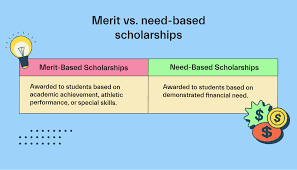What is the Difference between Merit-Based vs. Need-Based Scholarships?
When it comes to funding your education, scholarships can be a huge help. But with so many types out there, how do you know which one is right for you? Merit-based and need-based scholarships are two of the most common options. Each has its own purpose and requirements. This guide will explain both to your understanding, so you can confidently decide which one fits your situation.
What Are Scholarships?
Think of scholarships as free money for school. Unlike loans, you don’t have to pay scholarships back. They’re given to students to help cover the costs of education, such as tuition, books, or living expenses. Scholarships come in all shapes and sizes, and they’re funded by schools, governments, or private organizations.
For example:
- A school may give a scholarship to students with high grades.
- A company may offer one to students from low-income families.
Merit-Based Scholarships
What does “merit-based” mean?
It simply means “earned.” Merit-based scholarships are given to students who stand out for their achievements.
Eligibility Criteria (Who can apply?):
You might qualify if:
- You have a high GPA or strong test scores (like SAT, ACT, or WAEC results).
- You excel in sports, music, art, or leadership roles.
- You win a competition, such as a science fair or essay contest.
Examples of merit-based scholarships:
- National Merit Scholarship: This is given to students who score very high on the PSAT test in the U.S.
- Athletic Scholarships: Universities often give these to students who are great at sports. For example, a football player with exceptional talent might get a full scholarship to play for a school’s team.
Pros (Why it’s great):
- It rewards your hard work and talents.
- You don’t need to prove financial need to qualify.
- It’s often renewable if you keep up your performance.
Cons (Challenges):
- Very competitive—only the best applicants get them.
- You may need to meet strict requirements every year to keep the scholarship.
Need-Based Scholarships
What does “need-based” mean?
It’s all about financial need. These scholarships help students who may not afford college on their own.
Eligibility Criteria (Who can apply?):
You might qualify if:
- Your family’s income is low.
- You can prove financial hardship using forms like FAFSA (in the U.S.) or other financial aid applications.
Examples of Need-Based Scholarships:
- Pell Grants (U.S.): Federal aid for low-income students pursuing college.
- Chevening Scholarships (UK): Offers funding to talented students who might otherwise struggle to pay.
Pros (Why it’s great):
- Focuses on helping students from disadvantaged backgrounds.
- Less pressure to maintain a high GPA (though you still need to do well).
Cons (Challenges):
- You must meet strict financial criteria to qualify.
- Funds may not cover all your educational expenses.
Key Differences: Merit-Based vs. Need-Based Scholarships
| Feature | Merit-Based Scholarships | Need-Based Scholarships |
|---|---|---|
| How you qualify | Based on your achievements (grades, talents) | Based on financial need |
| Who gets them? | High-performing students | Students from low-income families |
| Examples | National Merit, Athletic Scholarships | Pell Grants, Institutional Aid |
Imagine a high school student named Sarah:
- If Sarah has a 4.0 GPA and wins a science competition, she might get a merit-based scholarship.
- If Sarah’s family earns less than $20,000 a year, she could qualify for a need-based scholarship to help her afford school.
Can You Apply for Both Merit-Based and Need-Based Scholarships?
Yes, absolutely! Some students qualify for both types. For example:
- You might be a top athlete (merit-based) and also come from a low-income household (need-based).
Pro Tip: Apply to as many scholarships as possible to increase your chances. Create a list of your achievements and gather financial documents to make the process smoother.
Tips for Choosing the Right Scholarship
- Assess Yourself: Are your grades or talents your strongest asset? Go for merit-based.
- Know Your Finances: If money is tight, need-based scholarships can offer more help.
- Research Hybrid Scholarships: Some scholarships consider both merit and need. For example, a scholarship might require high grades but give extra preference to low-income students.
Conclusion
Merit-based and need-based scholarships are both fantastic ways to fund your education. The key is understanding what each one offers and what you need to qualify. Take the time to research, prepare a strong application, and go after the opportunities that match your strengths and financial situation.
Start your scholarship journey today! Your future self will thank you.




